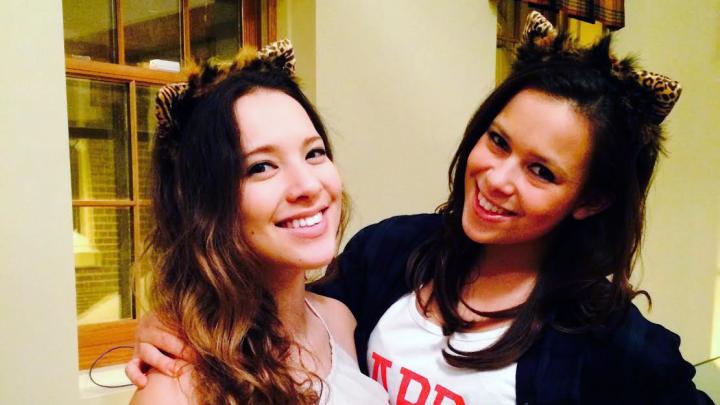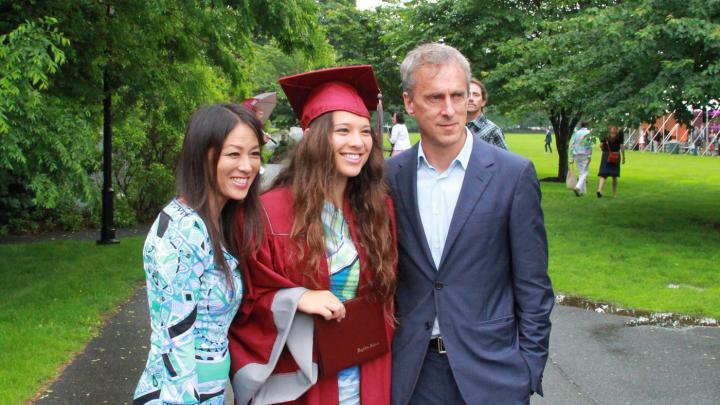Lulu Chua-Rubenfeld ’18 was once considered one of the most abused children in the Western world. A main character in her mother’s bestselling parenting memoir, Battle Hymn of the Tiger Mother, Lulu starred in many anecdotes that drew slings and arrows to the “Chinese way” of childrearing that Amy Chua ’84, J.D. ’87, champions in the book. At three, Chua locked Lulu outside in 20-degree weather after she disobeyed. At seven, she threatened to donate Lulu’s dollhouse to the Salvation Army bit by bit if she couldn’t master a piano piece.
Since the book was published in 2011, Chua’s two Jewish-Chinese-American daughters, Lulu and her elder sister, Sophia ’15, have captured the public imagination. How the two girls fare once they enter adulthood has become the final testament to whether Chua’s parenting style—which all but stirred a culture war—can really be justified. According to the book’s afterward, critics predicted that Chua’s children would grow up “friendless, robotic, mentally ill, and suicidal.”
It takes only a brief encounter with Lulu herself to realize how wrong they were. Now a rising sophomore at Harvard, she is thriving. A friend described her as a warm, witty, and popular girl who “somehow always gets away with hosting parties in her dorm.” Her boss at her summer job said she is charismatic, intuitive, and “willing to put herself out there.” Both praised her remarkable work ethic—a core value her mother sought to instill.
Most people who have not met Lulu expect her to be rigid and intense, according to Alana Steinberg ’18, a college friend, “but she’s much more of a free spirit than her reputation suggests.” In Battle Hymn, Lulu was portrayed as a rebellious “feral horse” who screamed, kicked, smashed glasses, and disobeyed her mother’s orders. “That’s absolutely Lulu: very independent and strong-willed,” Steinberg added. “Lulu does not conform to norms. She is her own person.”
Like many rising sophomores, Lulu is unsure about her career or even her concentration—art history, philosophy, and social studies are all potential choices. But she is unworried, exuding a confident I’ll-figure-it-out attitude. In stark contrast to the typical freshman who overfeeds at the smorgasbord of choices that Harvard offers, Lulu did not join any extracurricular activity (except a sorority), choosing to focus on academics in her first year. “A lot of people join way too many, just to have something on their résumé,” she said. “Nothing really stood out to me.”
As for sleep deprivation—a perennial complaint of college students—Lulu is happily getting a lot more sleep at Harvard than in high school. In her spare time, she reads, writes, and watches “lots of Netflix.” This summer, she is an intern at the startup Arthena, a crowdfunding platform for art collectors, where she reaches out to artists to conduct interviews and makes sales calls.
Detractors of Battle Hymn also predicted that Amy Chua’s children would be scarred for life, and alienated from their demon mother. Lulu seems to be neither. She speaks fondly of her mother and of oh-so-useful maternal advice, such as taking failures in stride, and “When you are feeling bad, look good.” Many college students feel pestered by their parents’ calls and messages, but Lulu texts her mother “all the time,” and complains that the Yale Law School professor is sometimes too busy to reply.
Battle Hymn—whose self-parody was lost on many readers—has been profoundly misunderstood by many Westerners who confuse “tiger parenting” with “helicopter parenting,” Lulu explained: “My mom is never the type of person who hovers over me to make sure I do my homework.” The essence of tiger parenting, instead, is in believing that a child can succeed, and pushing her to go all out. What makes the Tiger Mother truly happy is not that her child gets all As, but that the child is able to look back and say, “I couldn’t have worked any harder.” Her mother’s tough love has taught Lulu that blindly showering a child with praise without seeing actual results will not enhance self-esteem, and that “It’s important to push kids to reach their full potential.”
Perhaps the most telling sign of Amy Chua’s parenting success is the fact that, despite all the hair-tearing, glass-smashing, and (threatened) doll-burning, Lulu says, “I don’t think [I’ll raise my children] any other way.”









